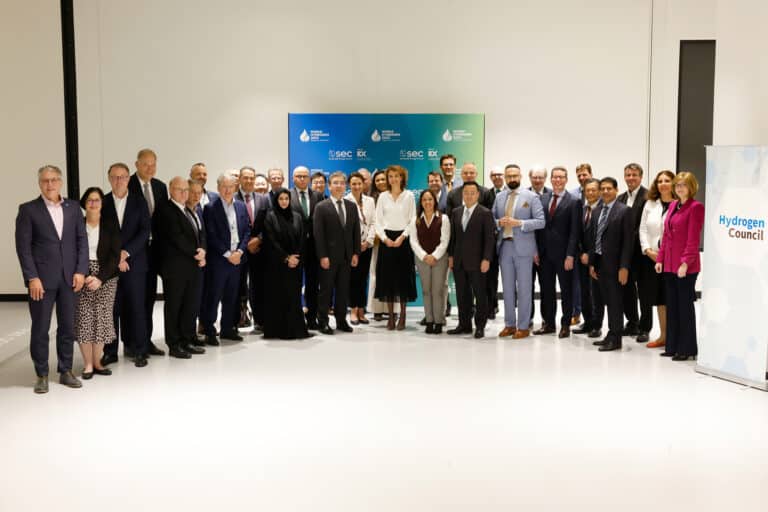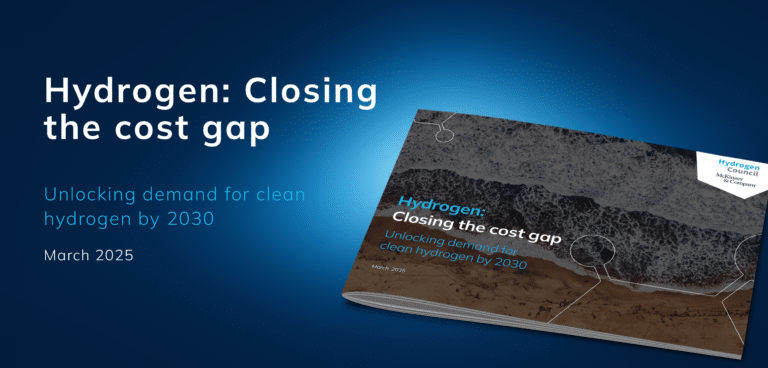Alstom was one of 13 founding members of the Hydrogen Council when the global CEO-led initiative was created in 2017. What does it mean to Alstom to be a founding member of the Council?
We are very proud to be part of the founding members of the Hydrogen Council. When we decided to launch this initiative with some other pioneers of the hydrogen ecosystem, we were very few players in the value chain, in the world. Today, it is easy to say that hydrogen is one of the keys to decarbonize our energy.
Looking back, I think the 13 founding members can all be proud of what we achieved together to promote hydrogen worldwide. The Hydrogen Council has been one of the major elements of the last five-year change.
Why did Alstom want to be a part of the Hydrogen Council?
It was an obvious decision to support this joint initiative at Davos in 2017 because we had just developed the first hydrogen regional train in the world. As a pioneer, we felt we had the duty to support the development of the hydrogen ecosystem as one element of the global solution to save our planet.
More than five years have passed since the Hydrogen Council launched and the organization has grown significantly in that time. What are some of the biggest milestones achieved so far?
The great news is that Alstom is no more the only player in high power usages! And competition will create emulation and bring better and more affordable solutions to democratize hydrogen worldwide.
Concerning the Hydrogen Council itself, I would say that we achieved two major steps. First, now everybody knows that hydrogen is part of the solution. Second, to get huge private investments with impressive support from public authorities.
There is still a job to do: notably to transform money into robust and reliable ecosystem to save our planet. But we can state that hydrogen is now part of the public debate and this visibility is supportive.
Alstom achieved its own milestone this year with the Coradia iLint travelling 1,175km without refueling the hydrogen tank, only emitting water and operating with very low levels of noise. What’s next for the world’s first hydrogen-powered train?
Thanks for highlighting this world record forecasted live on social media. 1,175km demonstrated range in real conditions mean that we have proven that hydrogen fuel cells trains are reliable and efficient.
But there is an even better demonstration than a record: it is the everyday operation of these trains with passengers. You can buy a ticket for this train in Germany today if you want in the area of Hamburg and soon near Frankfurt. We have delivered the first fleet of hydrogen trains in the world and our Coradia iLint has already been tested in numerous countries in Europe.
Now we are focusing on two objectives: to offer the best solutions to operate these hydrogen trains at the lowest costs and to provide solutions to decarbonise the railway freight.
With regards to hydrogen, what does Alstom have planned for 2023?
Alstom has just been granted support through IPCEI to develop and deliver three disruptive high-power products to the world powered by hydrogen fuel cells: a new generation of regional trains for Italy, an H4 shunting locomotives for freight and another new world first with Engie to decarbonize the railway freight.
Alstom is extremely active in hydrogen and will continue to support hydrogen ecosystem in the next decade.
About The Hydrogen Council
The Hydrogen Council is a global CEO-led initiative that brings together leading companies with a united vision and long-term ambition for hydrogen to foster the clean energy transition. The Council believes that hydrogen has a key role to play in reaching our global decarbonization goals by helping to diversify energy sources worldwide, foster business and technological innovation as drivers for long-term economic growth, and decarbonize hard-to-abate sectors.
Using its global reach to promote collaboration between governments, industry and investors, the Council provides guidance on accelerating the deployment of hydrogen solutions around the world. It also acts as a business marketplace, bringing together a diverse group of 140+ companies based in 20+ countries across the entire hydrogen value chain, including large multinationals, innovative SMEs, and investors.
The Hydrogen Council also serves as a resource for safety standards and an interlocutor for the investment community, while identifying opportunities for regulatory advocacy in key geographies.
To find out more visit www.hydrogencouncil.com and follow us on Twitter @HydrogenCouncil and LinkedIn.
Joanna Sampson, Communications Manager, Hydrogen Council
joanna.sampson@hydrogencouncouncil.com



